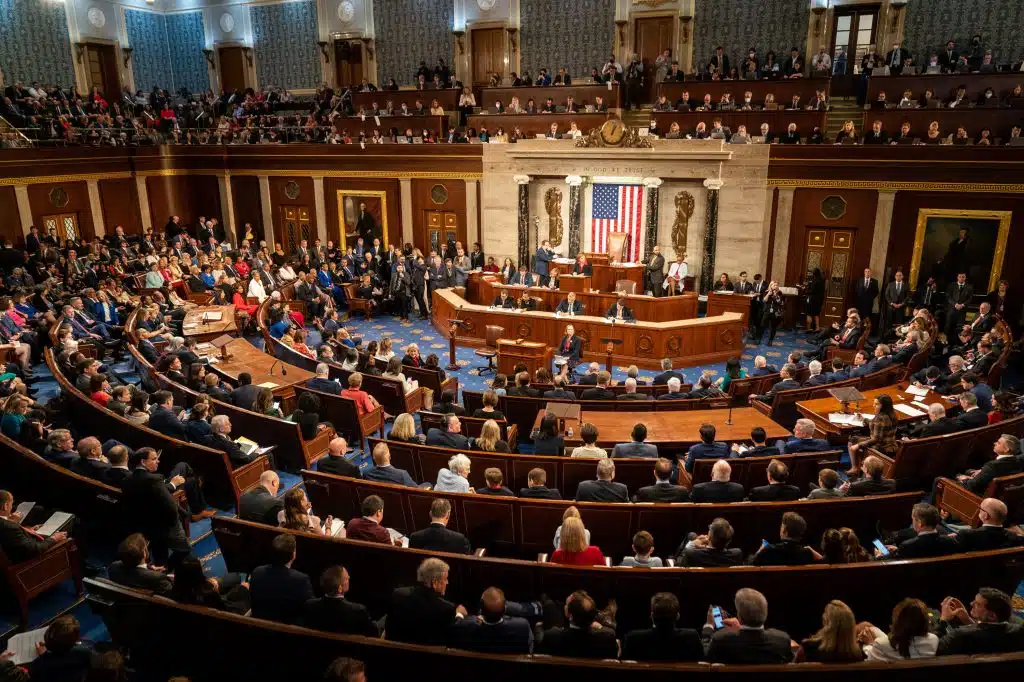Opponents of the proposed Credit Card Competition Act expect the bill will be reintroduced in Congress, so the Electronic Payments Coalition launched a pre-emptive strike late Wednesday with a report detailing the bill’s potential economic impact.
The study, conducted by Oxford Economics Research, claims the CCCA’s impact on the U.S. economy four years after passage would be a drop of $227 billion in discretionary consumer spending and the loss of 156,000 jobs.
First introduced in July 2022 and again in June the following year, the CCCA did not come up for a vote in either session of Congress. Opponents like the EPC and advocates including merchant organizations expect the legislation will be reintroduced in the current Congress, which was seated Jan. 3. The bill proposes to reduce merchants’ credit card acceptance costs by requiring a wider choice of networks for processing. Financial institutions with $100 billion or more in assets would be required to enable at least one network other than Visa o Mastercard.

The EPC is touting its report as part of an effort to educate members of Congress on “what the CCCA will do to the U.S. economy,” EPC Chairman Richard Hunt said during a press conference announcing the study. “Congress has yet to do an economic impact study on the CCCA, so the EPC decided to do one to help Congress understand how economically draconian this legislation will be,” Hunt said.
If the CCCA passes, credit card issuers would suffer a substantial loss of interchange revenue, forcing them to reduce value-added services, primarily rewards, the EPC argues. A reduction in rewards would prompt rewards cardholders to reduce their discretionary spending on those cards, as well as across all payment methods.
Some 86% of consumers, and 77% of lower-income consumers, actively use rewards cards, according to 2021 data from the American Bankers Association, which Oxford Economics Research cited in its study.
Industries hardest hit by the decline in consumer spending would include entertainment and recreation, hotels, dining and catering, retail, and transport services, the EPC says.
Cities dependent on travel and recreation would see the biggest decline in consumer spending, according to the study. Miami, for example, is projected to lose $6.5 billion in consumer spending during the first four years after the CCCA’s passage. Las Vegas would experience a $5.8 billion loss, and Orlando a $3.7 billion loss.
While large metropolitan areas would see the biggest spending declines, smaller destinations will feel proportional losses, says Neil Walker, managing director of macro modeling and scenarios for Oxford Economics.
Ski-resort towns such as Aspen, Vail, and Breckenridge, Colorado would see a decline of $236 million in consumer spending over four years, while national memorial Mt. Rushmore would see a loss of $114 million, he figures.
“The effects at the local level are even more pronounced. The data highlights the outsized impact this policy could have on areas dependent on travel and hospitality-driven revenues, which are especially vulnerable to shifts in rewards-driven consumer behavior,” Walker says in a statement.
But merchant organizations question the validity of the report’s findings, citing other studies that show the economic impact of the CCCA would be far less than the Oxford Economics study claims.
“This study is a piece of warmed-over fantasy that presents discredited assumptions about the CCCA’s impact on rewards cards,” says Doug Kantor, an executive committee member for the Merchants Payments Coalition and general counsel for the National Association of Convenience Stores. “Card issuers earn more than $300 billion annually in interest income and cardholder fees and pay out just $41 billion annually in rewards.”
Issuers could pay “six times” what they currently pay in rewards and “still have plenty of profit left over,” Kantor adds.
Both Kantor and Hunt expect the CCCA to be reintroduced, even though one of the bill’s sponsors, Sen. Richard Durbin of Illinois, has not committed to running for reelection in 2026.
Kantor expects the legislation to be reintroduced because “it is gaining momentum,” but Hunt argues the bill’s sponsors will reintroduce it to make good on their promises to the merchant community that the bill will pass.
“Retailers were promised a CCCA victory, so the bill’s sponsors have to try and save face,” Hunt says. “Most believe Durbin is in his last two years [in Congress] and won’t run again, so he will launch an all-out effort to get the bill passed.”





